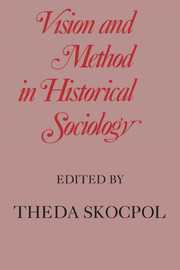Book contents
- Frontmatter
- Contents
- Preface
- 1 Sociology's Historical Imagination
- 2 The Social and Historical Landscape of Marc Bloch
- 3 Beyond the Economistic Fallacy: The Holistic Social Science of Karl Polanyi
- 4 Configurations in History: The Historical Sociology of S. N. Eisenstadt
- 5 Theoretical Generalization and Historical Particularity in the Comparative Sociology of Reinhard Bendix
- 6 Destined Pathways: The Historical Sociology of Perry Anderson
- 7 E. P. Thompson: Understanding the Process of History
- 8 Charles Tilly's Collective Action
- 9 The World System of Immanuel Wallerstein: Sociology and Politics as History
- 10 Discovering Facts and Values: The Historical Sociology of Barrington Moore
- 11 Emerging Agendas and Recurrent Strategies in Historical Sociology
- An Annotated Bibliography on Methods of Comparative and Historical Sociology
- Notes on the Contributors
1 - Sociology's Historical Imagination
Published online by Cambridge University Press: 05 June 2012
- Frontmatter
- Contents
- Preface
- 1 Sociology's Historical Imagination
- 2 The Social and Historical Landscape of Marc Bloch
- 3 Beyond the Economistic Fallacy: The Holistic Social Science of Karl Polanyi
- 4 Configurations in History: The Historical Sociology of S. N. Eisenstadt
- 5 Theoretical Generalization and Historical Particularity in the Comparative Sociology of Reinhard Bendix
- 6 Destined Pathways: The Historical Sociology of Perry Anderson
- 7 E. P. Thompson: Understanding the Process of History
- 8 Charles Tilly's Collective Action
- 9 The World System of Immanuel Wallerstein: Sociology and Politics as History
- 10 Discovering Facts and Values: The Historical Sociology of Barrington Moore
- 11 Emerging Agendas and Recurrent Strategies in Historical Sociology
- An Annotated Bibliography on Methods of Comparative and Historical Sociology
- Notes on the Contributors
Summary
Every social science – or better, every well considered social study – requires an historical scope of conception and a full use of historical materials.
C. Wright MillsIn a basic sense, sociology has always been a historically grounded and oriented enterprise. As wise commentators have pointed out again and again, all of the modern social sciences, and especially sociology, were originally efforts to come to grips with the roots and unprecedented effects of capitalist commercialization and industrialization in Europe. What accounted for the special dynamism of Europe compared to other civilizations, of some parts of Europe compared to others? How were social inequalities, political conflicts, moral values, and human lives affected by the unprecedented changes in economic life? Would industrializing capitalist societies break asunder or generate new forms of solidarity and satisfaction for their members? How would changes proceed in the rest of the world under the impact of European expansion? The major works of those who would come to be seen as the founders of modern sociology, especially the works of Karl Marx, Alexis de Tocqueville, Emile Durkheim, and Max Weber, all grappled with such questions. To varying degrees, all offered concepts and explanations meant to be used in truly historical analyses of social structures and social change.
- Type
- Chapter
- Information
- Vision and Method in Historical Sociology , pp. 1 - 21Publisher: Cambridge University PressPrint publication year: 1984
- 25
- Cited by

